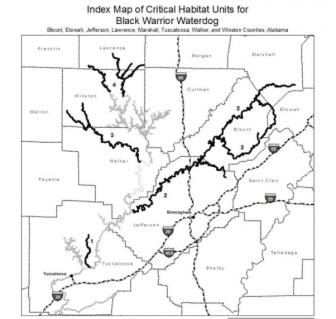Unique Alabama Salamander Now Federally Protected
The U.S. Fish and Wildlife Service announced Tuesday that it would protect a rare Alabama salamander under the Endangered Species Act. The Black Warrior waterdog, sometimes called the Alabama mudpuppy, is large, strange, and found only in the state.
Black Warrior waterdogs are nocturnal and can be almost a foot long. Their permeable skin and external gills make them sensitive to declines in water quality. That’s one reason the Fish and Wildlife Service listed them as endangered: their numbers have fallen because of habitat destruction and pollution in the Black Warrior River Basin from industrial plants, landfills, sewage treatment plants, construction, forestry, poultry farms, cattle feedlots, and mines. Dams disrupt the creatures’ lifecycle, too.
The Wildlife Service also designated 420 miles of the river and tributaries across 10 counties as critical habitat for the waterdog. Many of these places are already designated as critical for other endangered species, so regulators say little further action is needed.
A statement from the Fish and Wildlife Service says, “The habitat designation should have minimal or no impact on the forestry and coal mining community.”
But private landowners could face extra hurdles for projects that need federal funding or permits.
The Black Warrior waterdog was first put on the candidate list for federal protection in 1982. The Center for Biological Diversity, a national nonprofit conservation group based in Tucson, petitioned for the salamander’s protection in 2004 and again in 2010. Today’s decision is partly a result of CBD efforts.
“Aquatic salamanders like the Black Warrior waterdog are indicator species that reflect the health of the environment we all share,” says CBD senior scientist Tierra Curry. “Protecting this special amphibian and its habitat will help protect water quality for both waterdogs and people.”
In Birmingham, Black Warrior Riverkeeper staff attorney Eva Dillard says, “The U.S. Fish and Wildlife Service made our New Year happy today.”
But the group didn’t get everything it had hoped for.
Dillard says the Wildlife Service had originally “proposed to designate 669 river miles within eleven tributaries of the Black Warrior River basin as critical habitat. Unfortunately, the Service’s announcement today cuts that proposed habitat by a third … While we are disappointed that the waterdog’s habitat was not fully protected as first proposed, we are pleased with the listing of the waterdog as endangered and the designation of critical habitat for this imperiled species.”
Nelson Brooke of Black Warrior Riverkeeper took part in the peer review process. The rule goes into effect in 30 days.
The Black Warrior waterdog spends almost all its life at the bottom of streams under submerged ledges, logs and rocks. It also retains juvenile features like feathery gills and a tail fin even after it matures.
Poland’s Iga Świątek thrashes American Amanda Anisimova in Wimbledon women’s final
The Polish player emerged victorious after less than an hour of gameplay.
Israeli settlers beat U.S. citizen to death in West Bank
A 21-year-old Florida man was beaten to death by Israeli settlers while visiting family in the West Bank.
FEMA removed dozens of Camp Mystic buildings from 100-year flood map before expansion, records show
Federal regulators repeatedly granted appeals to remove Camp Mystic's buildings from their 100-year flood map, loosening oversight as the camp operated and expanded in a dangerous flood plain.
In Myanmar, a rush for rare earth metals is causing a regional environmental disaster
A drastic increase in unregulated production of rare earth minerals in Myanmar is causing serious environmental concerns downriver in Thailand, as China's influence in the sector looms large.
No playing Spanish-language music: Many immigrants say they have new rules for driving
As the Trump administration's crackdown continues, traffic stops have become increasingly important tools of enforcement. It has led many immigrants to take alternate modes of transportation.
In the Texas flood zone, volunteers help reunite lost pets with their owners
Hundreds of pets have been reported missing after the devastating floods in central Texas. Volunteers have been combing through debris to help reunite them with their owners.






